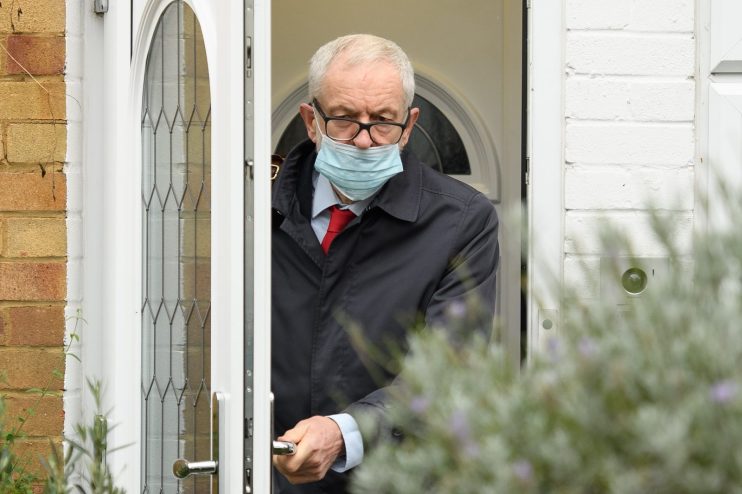For Corbyn and antisemitism, “sorry” still seems to be the hardest word

One of the markers of genuine leadership is being able to recognise when you have been wrong, to apologise, and to commit to a change of course.
This is an attribute that Jeremy Corbyn had multiple opportunities to demonstrate as the Labour party lurched from one antisemitism crisis to the next under his leadership. Each time, he opted for evasion over accountability.
There were myriad reasons why Labour members — including elected officials — felt emboldened to voice the most reprehensible antisemitic views with impunity, but it was never the fault of the party, and certainly not due to the negligence (or, indeed, sympathy) of its leader.
If there were any remaining justification for this deplorable masquerade, yesterday it was torn away.
The long-awaited Equality and Human Rights Commission (EHRC) report into antisemitism in the Labour party was damning in its conclusions, not only about the character of the institution — which it found was “responsible for unlawful acts of harassment and discrimination” — but about Corbyn’s specific role in it.
Six months since handing the reins to Sir Keir Starmer, Corbyn was yesterday given a final chance to accept his mistakes and apologise to the Jewish community for his willful blindness of Labour’s documented antisemitism crisis. Instead, he chose to throw one last spiteful grenade into their faces.
Where one might have expected contrition or even empathy, Corbyn’s brief response to the EHRC findings was defiantly unapologetic. In a classic example of political gaslighting, his excuse was that the flaws in Labour’s complaints process predated his leadership, and that his team’s interference — catalogued in the EHRC report — improved rather than obstructed it.
After a reluctant and cursory acknowledgement that antisemitism does indeed exist in the party, he claimed “the scale of the problem was also dramatically overstated for political reasons by our opponents inside and outside the party, as well as by much of the media”, before asserting “that combination hurt Jewish people”, as if it were the reporting of antisemitic comments from within Labour that caused distress, rather than the comments themselves.
Finally, he declared that he did not accept all the findings — findings which state that “antisemitism within the Labour party could have been tackled more effectively if the leadership had chosen to do so” — and suggested we can now all move on.
If there was a silver lining to this brazen display of contempt for those who have faced antisemitic abuse and harassment from Corbyn’s cronies over the years, it was that it provided justification for the new Labour leader to signal his commitment to changing tack by suspending his predecessor from the party. Exactly one year since Corbyn went into an election campaign to be the next Labour Prime Minister, he is now no longer even a Labour MP.
Starmer, meanwhile, is working overtime to distance himself from the leader he himself was working to elect just 12 short months ago. Whereas other moderate Labour figures quit the front bench or even the party in protest of Corbyn’s antisemitic apologism, Starmer remained in the shadow cabinet, and now faces an uphill battle to convince those disgusted by the report that he was not also complicit.
If the agreement in July to pay an estimated £500,000 in damages to Labour whistleblowers who spoke out about the the party’s antisemitism complaints procedure was the first headline-grabbing step in that rehabilitation process, suspending Corbyn with such speed is surely the second.
That may not be enough to persuade homeless left-wing Jews that the party which so recently tacitly sanctioned discrimination against them is now a safe political space. Rebuilding trust with the Jewish community will take time. With so many in the party, including a number of elected councillors, still insisting that antisemitic tropes and fevered conspiracy theories about Israel do not constitute racial bigotry, many Jews will be reluctant to ever vote Labour again.
But Starmer has taken one step that Corbyn never could: he has taken responsibility, telling the nation unequivocally “I am truly sorry for all the pain and grief that has been caused”.
As a Jewish constituent of Islington North, I have for six years been represented in the House of Commons by a man who refused to even acknowledge that this pain and grief existed, let alone his own role in causing it. I have watched him preside over a party I once voted for as it ignored the harassment of my community, condemning not the perpetrators of antisemitism but those who dared to call attention to it. From wreath-laying at the graves of Jew-killing terrorists to endorsing a mural depicting the most disgusting antisemistic imagery, my MP repeatedly demonstrated that he was not interested in the votes of people like me.
I could never have voted for Labour under Jeremy Corbyn. Nor could I vote for the party if Corbyn were my Labour candidate. It is too early to look ahead to the next election, and Corbyn’s suspension is temporary, pending investigation. But Starmer’s quick action and personal apology have made it possible that I might one day consider giving Labour my vote. That is a true sign of leadership.
Because in the end, after four years of Corbynite denial, defensiveness, and question-dodging deflection, it took just two words to begin to turn the tide on Labour’s antisemitism crisis: “I’m sorry”.
Main image credit: Getty